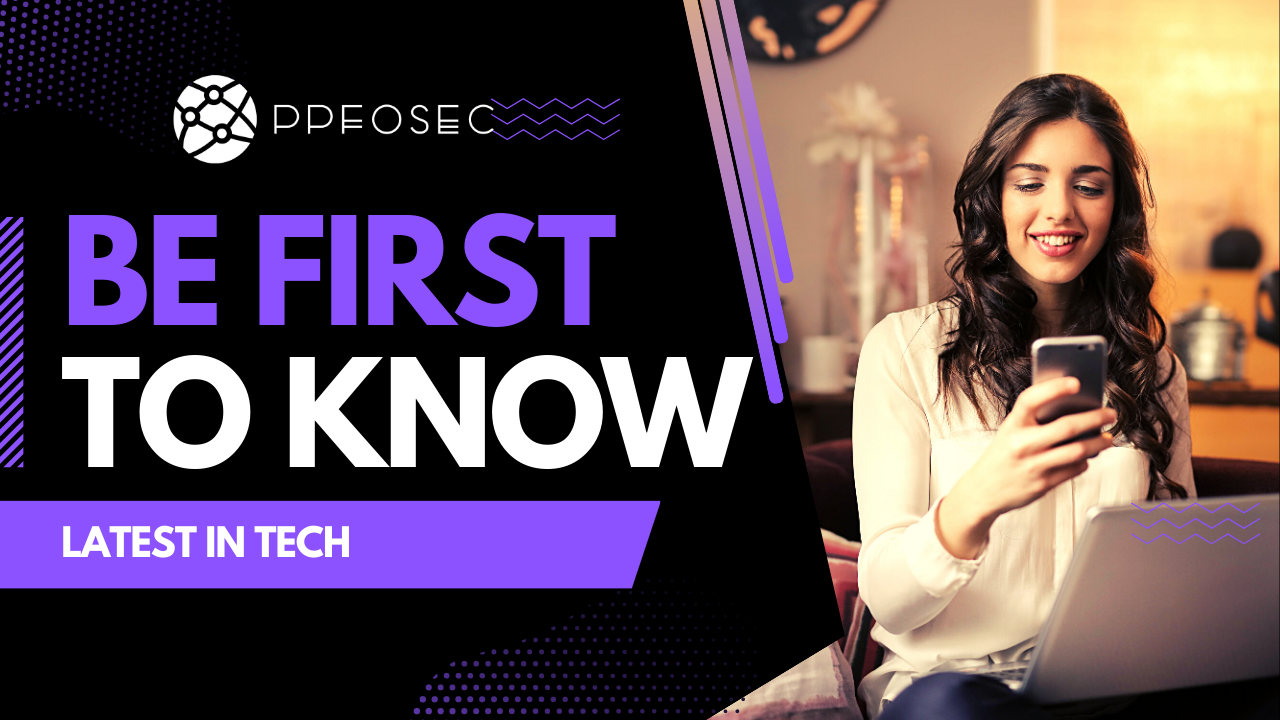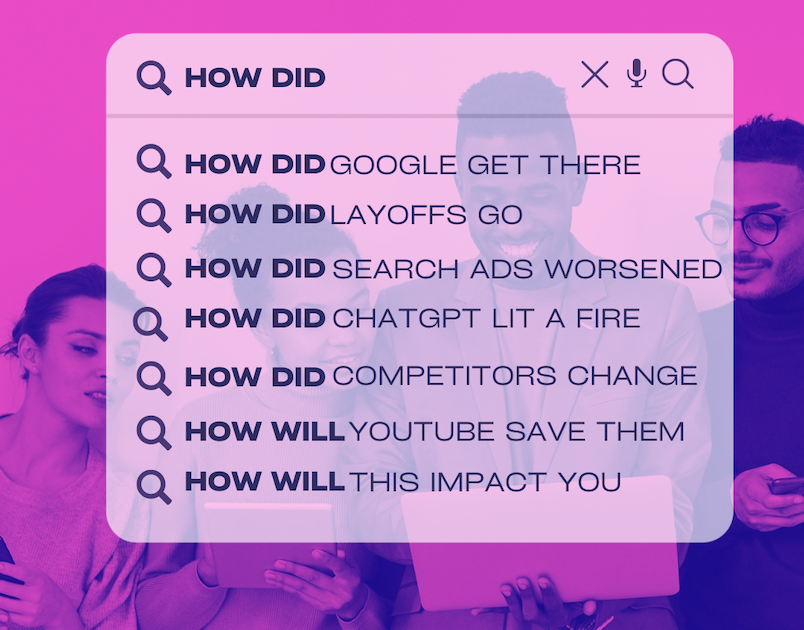What Is Going On With Google?
The Google Search we have always known is hitting crossroads. With threats from TikTok, ChatGPT, and Apple, Google needs to reinvent itself. At the same time, its mass layoffs suggest Google might have settled into a corporate mindset. How will this crisis change your online experiences?

What's the first thing you googled? I don't remember either. My oldest online search memory is when I looked up the Spawn film in 1997 on Yahoo at my father's workplace. This was a few years before Yahoo embedded Google as its search engine. Google outgrew Yahoo within 3 years.
Google's search algorithm eclipsed everyone during the early 2000s due to the "backlink" parameter. While other search engines focused on keywords, Google leveraged implicit popularity.
The rest is history. Google became the biggest web company in the world soon thereafter. Yahoo remained a cringe afterthought that failed to build a competent search engine for over a decade. Its brand never recovered.
Fast forward to today, and Google Search is having a Yahoo moment. The giant has never felt so threatened, both from a business and a product standpoint.
Let's look at the hard choices ahead for Google, what I think will happen next, and how this will impact you.

Google's Internal Turmoil Had Been Brewing for a Year, And Then Layoffs Happened
Google laid off 12,000 workers last week. These reductions happen despite record revenues and profits. My favourite article of the week, from the Pragmatic Engineer, breaks down how the events reflect on Google becoming "another IBM" which optimizes for shareholder value ahead of technical innovation.
In simple terms, everybody else is doing layoffs. If we don't, the stock will go down.
The recording of the Town Hall meeting following the mass layoffs paints a grim portrait of the tech giant, as shared by Business Insider. Employees were left in shock over being unceremoniously terminated via e-mail despite 10-15 years of service. Concerns over activist investor involvement remained more or less unanswered. Many asked for "psychological safety".
Looking at the past year, it's clear the layoffs emerge from a trend in Google.
As I wrote back in September, Google CEO Sundar Pichai cracked down on "passion project" time off and intended to shatter the "resting and vesting" image Google had built for itself.
This week also marks the official death of Google's cloud-gaming service Stadia. Google has cancelled so many projects that there are product cemeteries. The Google Cloud Platform will keep being profitable, but I argue Google remains, at its core, an ad business. And this part is in uncharted territories.
These events beg the question: can Google still lead the way?
Ads are Killing the Search Page
Adding to the concerns, Google's flagship product, the search page, faces its first real challenge. Nowadays, ads occupy most of the search real estate, especially on mobile. The Atlantic shares these concerns of decreased relevance. Worse, criminals are targeting the ad space to deliver malicious content!
Meanwhile, TikTok's share of both news and discovery content is increasing. Wired tried using TikTok as a search engine for a week and, while the factual content yielded nothing, searches around hobbies, leisure, and activities (a.k.a. the queries that have the biggest ad dollars tied to them) offered quality experiences. One could argue this new discovery experience also threatens Google Maps and, along with it, some of the plus-value of the Google services on Android.
Google knows and is adapting. I voiced my concerns in October about Google's new image-driven search page, which felt like a reactionary attempt to capture back TikTok's momentum.
I stand by my analysis: Google keeps a special status in our collective minds: it is our portal to the web. Users experience Google as a guide, not an attraction by itself. Tread carefully!
And of course...
The ChatGPT Panic is Real, But...
Like many, I realized ChatGPT was a big deal when I saw viral tweets claiming Google Search was dead. Speech felt more natural than 10 blue links. The Verge and New York Times report that Google is "freaking out" over the OpenAI product. Google plans to launch up to 20 AI products to demonstrate its presence.
Google's careful approach echoes Meta's. Its search chatbot was not released publicly due to misinformation and ethical concerns. OpenAI, a smaller company, could take such a risk to its brand. Imagine if Google had launched a similar inaccurate bot. I think the reception would not have been as positive.
Damned if you do, damned if you don't. Google did not embarrass itself with an inaccurate product, but its brand now looks behind the times.
Do you sense the pattern? A product graveyard, old search experience, conservative "traditional" business moves... it does feel like an "old" (read un-cool) company like IBM.
Yet I feel ChatGPT actually hides the forest from the tree because...
The Real Threat is Apple
Here is a $15 billion question: when will Apple decide it can make more money off its own search experience than getting payments from Google to be the default search engine of Mac devices?
How about an easier one? Did you know that Apple killed the third-party weather apps ecosystem on the iPhone back in 2020 over user privacy concerns?
Apple wants its users immersed in its ecosystem, always. Receiving payment from Google is more like a Faustian bargain: we can't beat Google search, let's do what's best for the user experience, and surrender some privacy.
This is true as long as Apple cannot deliver search on par with Google's. And now Apple is investing. The ATT tracking protection dealt a big blow to Meta, and a lesser one to Google, but Apple is very intent on building an ad business for itself, using privacy as a "wolf in sheep's clothing", so to speak.
As a privacy enthusiast, I feel torn between Apple's real benefits and its use of privacy to further anti-competitive behaviours. Yet, because Apple owns all the user's content on the device, it doesn't need similar third-party tracking features. Search is first-party data. Google, despite its Android imprint, cannot claim similar practices.
Meta needs to have Home Depot shadily send them its customer email addresses when they request a digital receipt in order to track conversions.
Apple has Apple Pay.
What if Apple builds a great search product? We would witness a similar storm like the iPhone weather app (see what I did?). Google would suffer an even more devastating blow than what ChatGPT reserves. The iPhone is just that powerful. Remember: ChatGPT is good for coding tips, and definitions. Ad money is in restaurants, hardware, leisure and activities.
So what's Google's best hope to stay on top?
YouTube is the Lifeboat
Google recently announced an aggressive monetization strategy for video shorts to combat TikTok. Despite still being the overall #1 video platform, YouTube saw TikTok beat them with teenagers. Yet if we look at Google's options, YouTube is best positioned to drive advertisement dollars in the future. Video beats text. Text will struggle with meaning in the AI-generative world. Generated video is unlikely to drive as much engagement on longer content. Search's long-term potential to drive ads is unknown. Therefore I predict the user's attention will remain on YouTube in the short term.
What Does This Mean For You? Get Ready to See Your Favourite Creators "Sell out"
In this universe, content becomes more valuable. We are already seeing the bidding wars for the most popular game streamers between YouTube and Twitch. I predict the tendency will explode in the upcoming years. The most popular streamers will get similar "TV" deals as we see for scripted shows. There are clues the exclusive contract bids might have already started.
Influencers are both incredible drivers of sales and of attention. YouTube remains on top of the viewing charts, and it will need prestige content.
I foresee many popular creators imitating "Ninja" and "xQc" by switching "networks" based on guaranteed contracts.
And here's the thing: we should not be mad about it.
Direct-to-consumer is my favourite business model. It allows creators to build small businesses for themselves and create niche content. But we need pop culture. Let's be happy our new medium allows personalities to become mainstream on their own terms.
Just remember one thing: it all started with a search.
🥊 Latest In Tech
Privacy and Cybersecurity
- An activist hacker found the Transport Service Authority (TSA) "no-fly" list on a mistakenly exposed Jenkins server, which hosted AWS credentials. Jenkins is a popular open-source tool used by developers to automate code deployment. At the risk of sounding uncool, as a cybersecurity expert and CEH, I believe the hacker's actions were unethical and wrong. An ethical hacker would have stopped the discovery of the Jenkins server as soon as it became evident internal files could be leaked and should have notified the airline. Hacker's blog post and Story
- Criminal hackers leaked the source code of the popular video game League of Legends (LoL). This is disastrous, as LoL is a cornerstone of eSports. Code analysis will reveal potential chats or hacks that will compromise the competition's integrity. The hack was described as "social engineering" (for example, somebody calling a developer and pretending to be an IT person to obtain their credentials) Story
- Yandex's source code was leaked by a former employee. Yandex is Russia's biggest search company. I'm already seeing so-called SEO specialists on Twitter trying to sell strategies based on what they gathered on the stolen code. I think this is unethical to profit off hacked content this way. Story
Business of Tech
- Amazon announces a $5/month prescription delivery service for common conditions such as blood pressure, anxiety and anemia. The service is part of Amazon Pharmacy, the company's attempt to break into the healthcare market. I wrote twice about how healthcare management is the biggest unsolved problem in the world right now. Amazon's project is more inspiring for me than whatever Meta is doing with VR headsets. Story
- Salesforce, the customer relationship management company, is under pressure from investors to refocus on its core business and mission. The giant was in "empire building" mode for the past decade. The party is over: the mega-acquisitions of data visualization software Tableau and conversation platform Slack are being questioned. I think analysts underestimate the impact of this shift in Salesforce's model. In my opinion: acquisitions are suddenly unsexy. Story
Artificial Intelligence
- To the surprise of no one, entertainment media company Buzzfeed will use ChatGPT to generate some of its clickbait content. Get prepared, and fine-tune your reverse Turing test to not waste your time on keyword-optimized dull content. Story
❓Question of the week
At what age did you learn that Google kept the history of all the searches you made on their website?
If you like my content, subscribe to the newsletter with the form below.
Cheers,
PP

